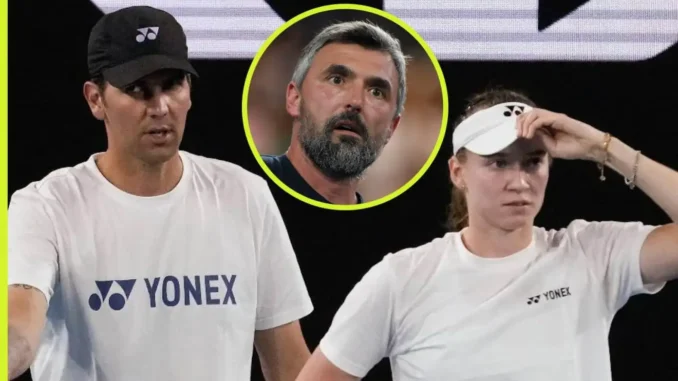
Elena Rybakina, a rising force in women’s tennis, has found herself at the center of a storm involving her former coach, Stefano Vukov. The controversy, which has garnered widespread attention, saw Rybakina part ways with Vukov amid claims of unprofessional behavior. Adding a new dimension to the discussion, Goran Ivanisevic, the esteemed coach of Novak Djokovic and a respected figure in tennis, recently weighed in on the matter, offering his perspective on Rybakina’s decision and the implications for her career.
Rybakina’s split from Vukov came as a surprise to many, given their successful partnership that included her breakthrough Wimbledon title in 2022. However, the relationship became strained over time, with reports suggesting that Vukov’s courtside conduct, often seen as overly intense and critical, played a role in the breakup. During matches, Vukov was frequently caught on camera displaying frustration, a behavior that sparked debates about the boundaries of coach-player dynamics.
Ivanisevic, known for his candidness, addressed the controversy during a recent interview. Having observed Rybakina’s rise and the unfolding drama, he shared his thoughts on the situation with a tone of understanding and experience. “I told her what I think,” Ivanisevic remarked, emphasizing his belief in honest communication and the importance of making decisions that align with a player’s long-term goals.
As someone who has navigated the highs and lows of professional tennis both as a player and a coach, Ivanisevic’s insights carry weight. He understands the unique pressures that come with high-stakes competition and the critical role a coach plays in a player’s journey. Reflecting on Rybakina’s situation, he noted that every player must prioritize their well-being and choose a team that fosters growth and confidence.
Ivanisevic also touched on the challenges of maintaining a healthy coach-player relationship in the modern game. In an era where cameras capture every move and emotions run high, the scrutiny on coaching behavior has intensified. He acknowledged that while passion and intensity are integral to the sport, they must be balanced with respect and professionalism. For Rybakina, finding a coach who supports her ambitions without compromising her comfort was likely a driving factor in her decision to part ways with Vukov.
Rybakina, for her part, has handled the situation with poise. While she has not delved deeply into the specifics of the split, her focus has remained on her career and upcoming tournaments. Known for her composed demeanor on and off the court, Rybakina’s priority is clearly her performance, as she aims to build on her impressive achievements and contend for more Grand Slam titles.
The controversy surrounding Vukov has reignited broader discussions about the dynamics of coaching in professional tennis. The relationship between a coach and player is one of the most pivotal aspects of a successful career, requiring mutual trust, respect, and clear communication. While some coaches are known for their fiery approach, others adopt a more measured style, tailoring their methods to suit the player’s personality and needs.
For Ivanisevic, who has worked with one of the game’s greatest champions, Novak Djokovic, the key lies in adaptability and understanding. He highlighted the importance of a coach recognizing when to push a player and when to offer support. In Rybakina’s case, the decision to move on from Vukov suggests a desire for a fresh perspective, one that aligns with her evolving aspirations and values.
The tennis world has largely rallied behind Rybakina, praising her for taking control of her career and addressing concerns that could impact her performance. Fellow players and fans alike have expressed admiration for her maturity and professionalism in handling a sensitive situation. As a young star with immense potential, Rybakina’s ability to navigate challenges off the court is as impressive as her prowess on it.
In the wake of the split, speculation has mounted about who might take over as Rybakina’s coach. The choice of a new mentor will be crucial in shaping the next phase of her career. With her powerful baseline game, precise serve, and calm temperament, Rybakina has all the tools to remain a dominant force in women’s tennis. The right coach could help her unlock even greater potential and add more titles to her growing resume.
Meanwhile, the discussion around Vukov’s behavior has sparked calls for a closer examination of coaching standards in professional tennis. Some argue that the intensity displayed by certain coaches can cross the line, affecting a player’s confidence and mental well-being. Others contend that passion and tough love are sometimes necessary to achieve greatness. The debate underscores the complex nature of the coach-player relationship and the need for balance.
As the tennis season progresses, all eyes will be on Rybakina as she works to put the controversy behind her and focus on her game. Her decision to prioritize her needs and take charge of her career sends a powerful message to aspiring athletes about the importance of self-advocacy and maintaining a supportive environment. With her talent and determination, Rybakina is well-positioned to achieve more success, and her journey will undoubtedly inspire many.
Ivanisevic’s comments serve as a reminder of the complexities of professional sports and the lessons learned through experience. His support for Rybakina and acknowledgment of the challenges she faced highlight the importance of fostering a positive and productive environment in the high-pressure world of tennis. For Rybakina, this new chapter represents an opportunity to grow, adapt, and continue her ascent in the sport she loves.
Leave a Reply